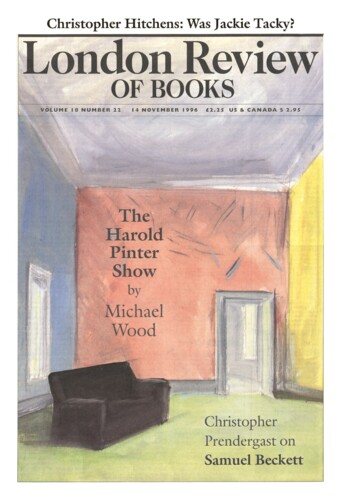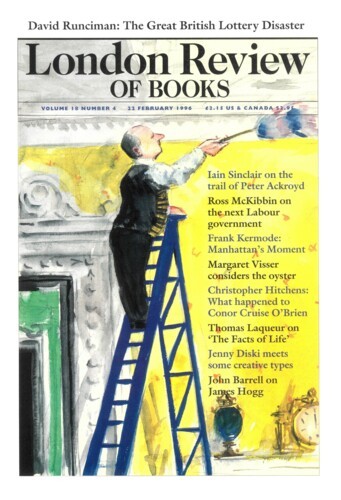Christopher Hitchens
Christopher Hitchens, who died in 2011 at the age of 62, wrote several dozen pieces for the LRB between 1983 and 2002. A Hitch in Time, a collection of some of them, is published by Atlantic.
National Treasure
Christopher Hitchens, 14 November 1996
The 44 Restaurant in the Royalton Hotel at 44 West 44th Street is a pretty suave and worldly Manhattan lunchery. So at any rate it seems to my provincial, country-mouse Washingtonian optic. I am sometimes taken there for a treat by my editors at Condé Nast, who use the place as a sort of staff canteen. My old friend Brian McNally, demonstrating that le patron mange ici, occasionally lets me sit at his table. I have learned not to point and squeak and say: ‘Look, isn’t that the girl from Dirty Dancing!’ Everybody acts very unconcerned about celebrity, though you get the occasional ‘Hi, Tina.’ The deliciousness of the food and the epicene beauty of the staff absorb most of one’s energy in any case. So I have a distinct memory of the occasion – not very many months before her last illness – when Jacqueline Kennedy Onassis stopped by for a snackette. I happened to be browsing and sluicing myself there that day, and was amazed to see hardened New Yorkers acting like the most abject stage-door Johnnies, and indeed Janes. The former First Lady sat in the main booth with her friends, looking serene and detached, while all sorts of people took their time collecting their hats or whatever, and rubbernecking shamelessly.’’
Porch Puppy
6 June 1996
A Hard Dog to Keep on the Porch
Christopher Hitchens, 6 June 1996
Oxford 1968-9. In the evenings, after dinner in hall, groups would take shape informally in the quad. There was Richard Cobb’s lot, making for the buttery and another round of worldly banter. There was this or that sodality, taking a cigarette break or killing time before revision. There was my own cohort, usually divided between the opposing tasks of selling the factional newspaper, or distributing the latest leaflet, or procuring another drink. And there were the Americans. I remember James Fenton noticing how they would cluster a little closer together and talk in a fashion slightly more intense. Mainly Rhodes or Fulbright scholars, they had come from every state of the union with what amounted to a free pass. The Yanks of Oxford were accustomed to going home and taking up a lot of available space in the American academy, in the American media and in American politics or diplomacy. Yet for this contingent, the whole experience had become deeply and abruptly fraught. They were far from home and they were deeply patriotic. You could tell that they had been told by their selection committees, before embarking on the Atlantic crossing, that they should comport themselves as ambassadors and emissaries. But those local lawyers and Rotarians and Chambers of Commerce had not prepared them to hurry up, finish their studies and take ship to Vietnam.
The Cruiser
Christopher Hitchens, 22 February 1996
Few things are harder to write than a sincere treatment in the style of ‘more sorrow than anger’. The sincerity is bound to get in the way of both the sorrow and the anger, and vice versa. One will be suspected, perhaps, of masking (beneath the regret) a covert relish. The ful-some style of the obituarist may creep in, causing one to be sanctimonious about the virtues in order to appear generous about the backslidings. Hypocrisy waits at every intersection. But it remains the fact that Conor Cruise O’Brien has been one of the great stylists of our time, whether writing about France, Britain, Ireland or Africa. It further remains a fact that his has been a voice attuned to the discourse of reason, and that when he has been ‘mobbish’ (his own preferred term for a bit of polemical exaggeration; no harm in it; no malice; the fellow needed a bit of a start anyway) then even this mobbishness has been generous, and a pleasure to read. O’Brien has been an internationalist, a wit, a polymath and a provocateur. I can still remember the excitement with which I discovered a copy of Writers and Politics, in a provincial library in Devonshire thirty years ago. Nobody who tries to write about either of those subjects, or about ‘the bloody crossroads’ where they have so often met, can disown a debt to the Cruiser. I hope that this is enough by way of sorrow and sincerity, though I could certainly have amplified it. Because the plain fact is that his latest book is a disgrace. Even if it doesn’t make one angry, it is a cause for disgust and depression. It fouls his reputation both for writing and for reasoning.
Pieces about Christopher Hitchens in the LRB
It’s Been a Lot of Fun: Hitchens’s Hitchens
David Runciman, 24 June 2010
In his book about religion, Peter Hitchens has a lot more to say about his brother Christopher than Christopher has to say about Peter in his book about himself.* ‘Some brothers get...
The Positions He Takes: Hitchens on Paine
John Barrell, 30 November 2006
‘If the rights of man are to be upheld in a dark time, we shall require an age of reason,’ wrote Christopher Hitchens last year on the dust jacket of Harvey Kaye’s recent book...
‘No Bullshit’ Bullshit: Christopher Hitchens, Englishman
Stefan Collini, 23 January 2003
Winning is very important to Christopher Hitchens. Dr Johnson was said to ‘talk for victory’, and by all accounts it seems the same might be said of Hitchens. He certainly writes for...
How would Richelieu and Mazarin have coped? Henry Kissinger
R.W. Johnson, 20 September 2001
In this short book, Christopher Hitchens sets down the main charges against Kissinger: murder, violation of human rights and complicity in mass atrocities on a scale equalled only by Eichmann,...
Mendacious Flowers: Clinton Baiting
Martin Jay, 29 July 1999
‘The crude commercialism of America, its materialising spirit, its indifference to the poetical side of things, and its lack of imagination and of high unattainable ideals are entirely due...
Why Calcutta?
Amit Chaudhuri, 4 January 1996
Among the welter of images and mythologies that constitute the middle-class Bengali’s consciousness – P3 and Ganesh underwear, the Communist hammer and sickle, Lenin’s face,...
Against it
Ross McKibbin, 24 February 1994
Christopher Hitchens may not be ‘the nearest thing to a one-man band since I.F. Stone laid down his pen’, but he comes close. For the Sake of Argument records a life of action, of...
Further Left
R.W. Johnson, 16 August 1990
Many years ago it was the habit of the PPE tutors in Magdalen College, Oxford to hold a discussion group for their undergraduates. At one such meeting we were somewhat disconcerted to find we had...
Royalties
John Sutherland, 14 June 1990
Deference to royalty in this country is enforced by a judicial and popular savagery which is always there but only occasionally glimpsed. The glimpses are instructive. In 1937 the diplomat...
Opportunities
David Gilmour, 1 June 1989
Hitchens was right to go West. He needed lusher plains of political corruption across which to spread himself. He needed a country of wide horizons and myopic international vision. And he needed...
Passionate Purposes
Keith Kyle, 6 September 1984
There used to be a type of book known as the ‘Secret History’ of some international problem. With some passion, extensive citation of material, and a somewhat self-regarding manner,...
Read anywhere with the London Review of Books app, available now from the App Store for Apple devices, Google Play for Android devices and Amazon for your Kindle Fire.
Sign up to our newsletter
For highlights from the latest issue, our archive and the blog, as well as news, events and exclusive promotions.



